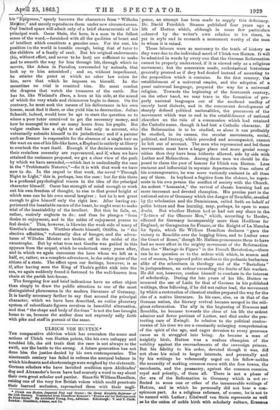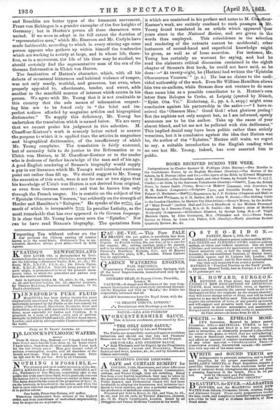ULRICH VON HUTTEN.*
Tux comparative oblivion which has overtaken the name and actions of Ulrich von Hutten points, like his own unhappy and troubled life, the old truth that the race is not always to the swift, nor the battle to the strong. A future generation has not done him the justice denied by his own contemporaries. The nineteenth century has failed to redress the unequal balance in which his deserts and shortcomings were weighed by the sixteenth. German scholars who have lavished erudition upon Alcibiades' dog and Alexander's home have had scarcely a word to say about their own great scholar and patriot. Since Sir William Hamilton, raising one of the very few British voices which could penetrate their learned seclusion, reproached them with their negli- • Ulrich von Mitten, Imperial Pod and Orator ; the Great Knightly Reformer of The 16th Century. Translated from Chauffour-Kestner's "Etudes sur lea Reformatenrs du lame Miele." By Archibald Young, Esq., Advocate. Edinburgh : T. and T. Clark. Loudaa Hamilton, Adams, and Co.
gence, an attempt has been made to supply this deficiency. Dr. David Friedrich Strauss published four years ago a life of Hutten which, although in some few particulars. coloured by the writer's own relation to his times, is yet in style and in research a monument worthy of the man to whom it is raised.
These labours were as necessary to the truth of history as they were due to the individual merit of Ulrich von Hutten. It will be admitted in words by every one that the German Reformation cannot be properly understood, if it is viewed only as a religious movement; but the concession made, ecclesiastical historians generally proceed as if they had denied instead of assenting to the proposition which it contains. In the first century, the establishment of a universal empire, and the adoption of a quasi universal language, prepared the way for a universal religion. Towards the beginning of the fourteenth century, on the other hand, we may trace in the formation of pro- perly national languages out of the confused medley of merely local dialects, and in the concurrent development of sharply defined political nationalities, the precursors of the movement which was to end in the establishment of national churches on the ruin of a communion which had retained the Catholic name, though it had lost a Catholic character. If the Reformation is to be studied, as alone it can profitably be studied, in its causes, the secular movements, social, political, and literary, which preceded and accompanied, cannot be left out of account. The men who represented and led these movements must have a larger place and more geuial recog- nition than they have been hitherto allowed, side by side with Luther aud Melancthon. Among these men we should be dis- posed to claim the post of honour for Ulrich von Hutten. Less. eminent and influential in separate departments than others of his contemporaries, be was more variously eminent in all than any of them. In boyhood a fugitive from the cloister, he repre- sents in his own person the conflict of society with the Church. An ardent "humanist," the revival of classic learning had no more incessant and devoted champion. His precise part in the national satire of Germany which the danger of Reuchlin, assailed. by the scholastics and the Dominicans, called forth on behalf of polite letters and free learning, may, perhaps, be open to some doubt. But whether Hutten had or had not any share in tha "Letters of the Obscure Men," which, according to Herder,. effected for Germany incomparably more than Hudibras for England, or Garagantua for France, or the Knight of La Mancha for Spain, which Sir William Hamilton declares "gave the victory to Reuchlin over the begging friars, and to Luther over the Court of Rome," though Mr. Hallam pronounces them to have had no more effect in the mighty movement of the Reformation than the "Manage de Figaro" in the French Revolution,—there can be no question as to the ardour with which, in season and out of season, he opposed polite studies to the pedantic barbarism alike of the schoolmen in theology and of the " Bartolists " in jurisprudence, an ardour exceeding the limits of fair warfare. He did not, however, confine himself to combats in the interest of scholarship. During the late years of his life, Hutten re nounced the use of Latin for that of German in his published writings, thus following, if he did not rather lead, the movement by which a restoration of classical studies prepared the way for the rise of a native literature. In his case, also, as in that of the German nation, the literary revival became merged in the reli- gious reformation. The ally in the beginning of Erasmus and Reuchlin, he became towards the close of his life the ardent admirer and fierce partizan of Luther, and died under the pro- tecting care of Zwingli. In relation to the political contro- versies of his time we see a constantly enlarging comprehension of the spirit of the age, and eager devotion to every generous cause as it struggled into being. As became a man of knightly birth, Hutten was a zealous champion of the nobility against the encroachments of the sovereign princes. But his fidelity to his order, devoted though it was, did not close his mind to larger interests, and personally and by his writings he vehemently urged on his fellow-nobles the necessity of making common cause with the free towns, the merchants, and the peasantry, against the common enemies, royal and priestly, of them all. There is not a phase of the era of the Reformation in Germany which is not re- flected in some one or other of the innumerable writings of Hutten, and in which he personally did not bear a con- spicuous part. As a religious reformer, of course, he is not to be named with Luther ; Eitelwolf von Stein represents as well as he the union of noble birth with scholarly culture, Erasmus
and Reuchlin are better types of the humanist movement, Franz von Sickingen is a grander exemplar of the free knights of Germany ; but in Hutten's person all these characters were
united. If we were to adopt in its full extent the doctrine of 4‘ representative men," which Mr. Emerson and Mr. Carlyle have
made fashionable, according to which in every stirring age some person appears who gathers up within himself the tendencies which are working in society at large, and in whose life, there- fore, as in a microcosm, the life of his time may be studied, we should certainly find the representative man of the era of the German Reformation in Ulrich von Hutten.
The fascination of Hutten's character, which, with all his -defects of occasional bitterness and habitual violence of temper, was not only manly, truthful, and generous, but even, when properly appealed to, affectionate, tender, and sweet, adds another to the manifold sources of interest which centre in his person. We agree with Mr. Young that it is not creditable to this country that the sole means of information respect- ing him are to be found only in "the brief and im- perfect notices afforded by magazine articles and biographical
.dictionaries." To supply this deficiency, Mr. Young has undertaken the translation which is named below. We are sorry -that we cannot praise his judgment in this selection. M. Ohauffour-Kestner's work is scarcely better suited to answer the purpose to which it is applied than the articles in magazines and biographical dictionaries, of the insufficiency of which Mr. Young complains. The translation is fairly executed, but of necessity fails to do justice to the Reformation or to Ulrich von Hutten, to M. Chauffour-Kestner or to the reader who is desirous of further knowledge of the man and of his age. A good English rendering of Strauss's biography would supply a gap in our literature which Mr. Young's well-intended exertions point out rather than fill up. We should suggest to Mr. Young the execution of this work, were it not for one or two signs that his knowledge of Ulrich von Hutten is not derived from original, or even from German sources ; and that he knows him only through the French tongue. He is ecstatic on the subject of the 4' Epistolie Obscurorum Virorum," but evidently on the strength of Herder and Hamilton's "Eulogies." He speaks of the aatirz, iiie 'merit of which is inseparah1. irr.M1 lis peculiar Latinity, as the mod' felitarkable that has ever appeared in the German language. It is clear that Mr. Young has never seen the "Epistles." Nor an he have read Strauss's biography. The quotations from
it which are contained in his preface and notes to M. C ffour-
Kestner's work, are entirely confined to such passages Mr. Young found translated in an article which appeared OUT years since in the National Review, and aro given in he words thus employed. This coincidence in the selection and rendering of the extracts cannot be accidental; other instances of second-hand and superficial knowledge might be given, as well as of loose assertion. For instance, Mr. Young has certainly no warrant for saying, and had he read the elaborate critical discussion contained in the eighth chapter of Strauss's first book, he could not have said, as he does :—" At twenty-eight, be (Hutton) had written the 'Epistola3 Obscurorum Virorum.' " (p. 4.) He has no claims to the undi- vided authorship of the work. Even Sir William Hamilton allows him two co-authors, while Strauss does not venture to do more than name him as a possible contributor to it. Hutten's own letter from Bologna to Croke, at Leipzig (voted by Munch, " Epist. Oho. Vir." Einleitung, ii., pp. 4, 5, seqq.) might seem conclusive against his partnership in the satire :—" I have re- ceived the 'Obscure Men.' Good God ! what glorious .jesting! But the sophists not only suspect but, as I am informed, openly announce me to be the author. Take up the cause of your absent friend, and let me not be polluted with this defilement." This implied denial may have been politic rather than strictly veracious, but it is conclusive against the idea that Hutten was be, the author of the "Epistles." Hutten still waits, we regret to say, a suitable introduction to the English reading what no one but Mr. Young, indeed, has ever asserted him to public.































 Previous page
Previous page